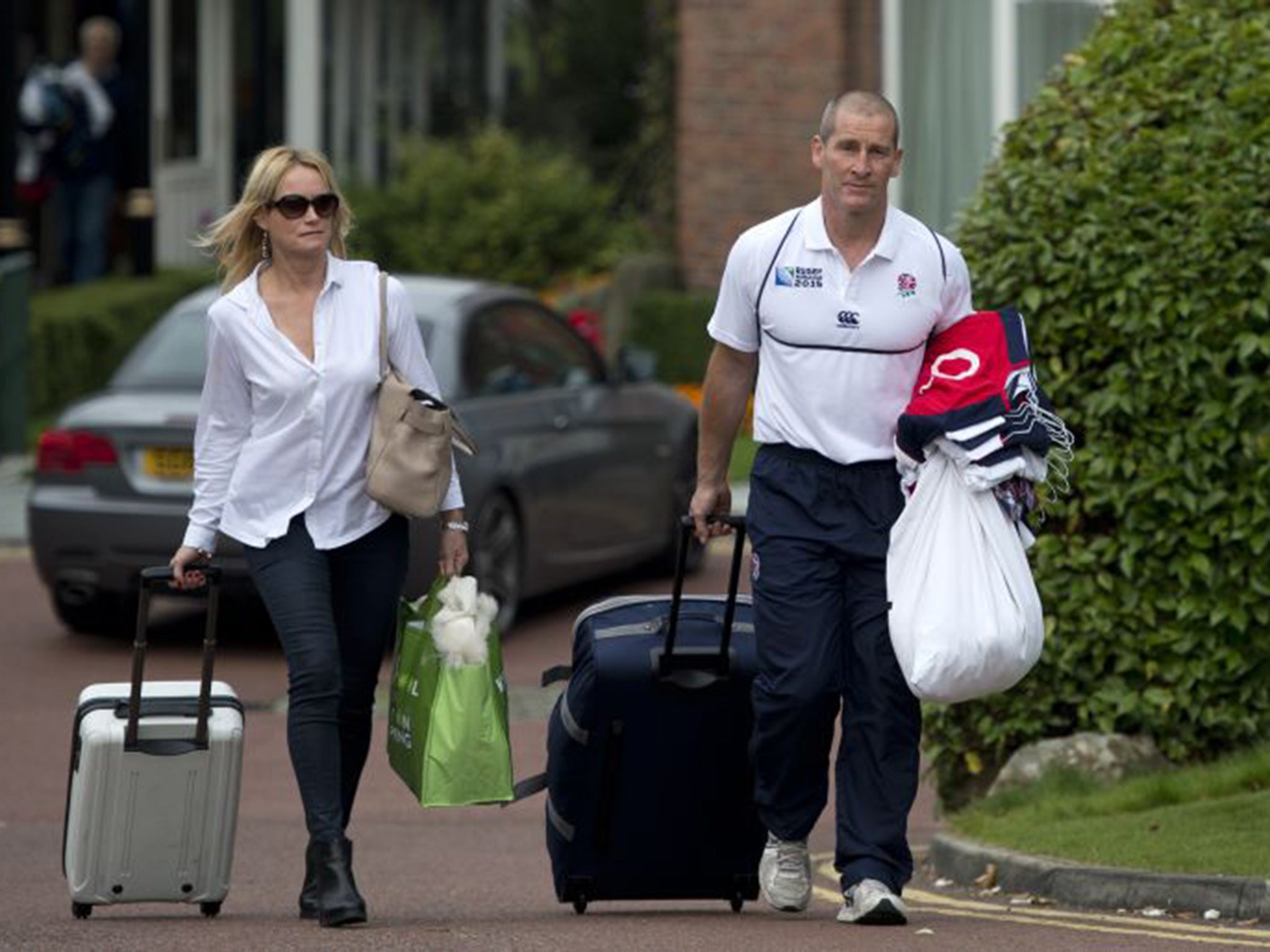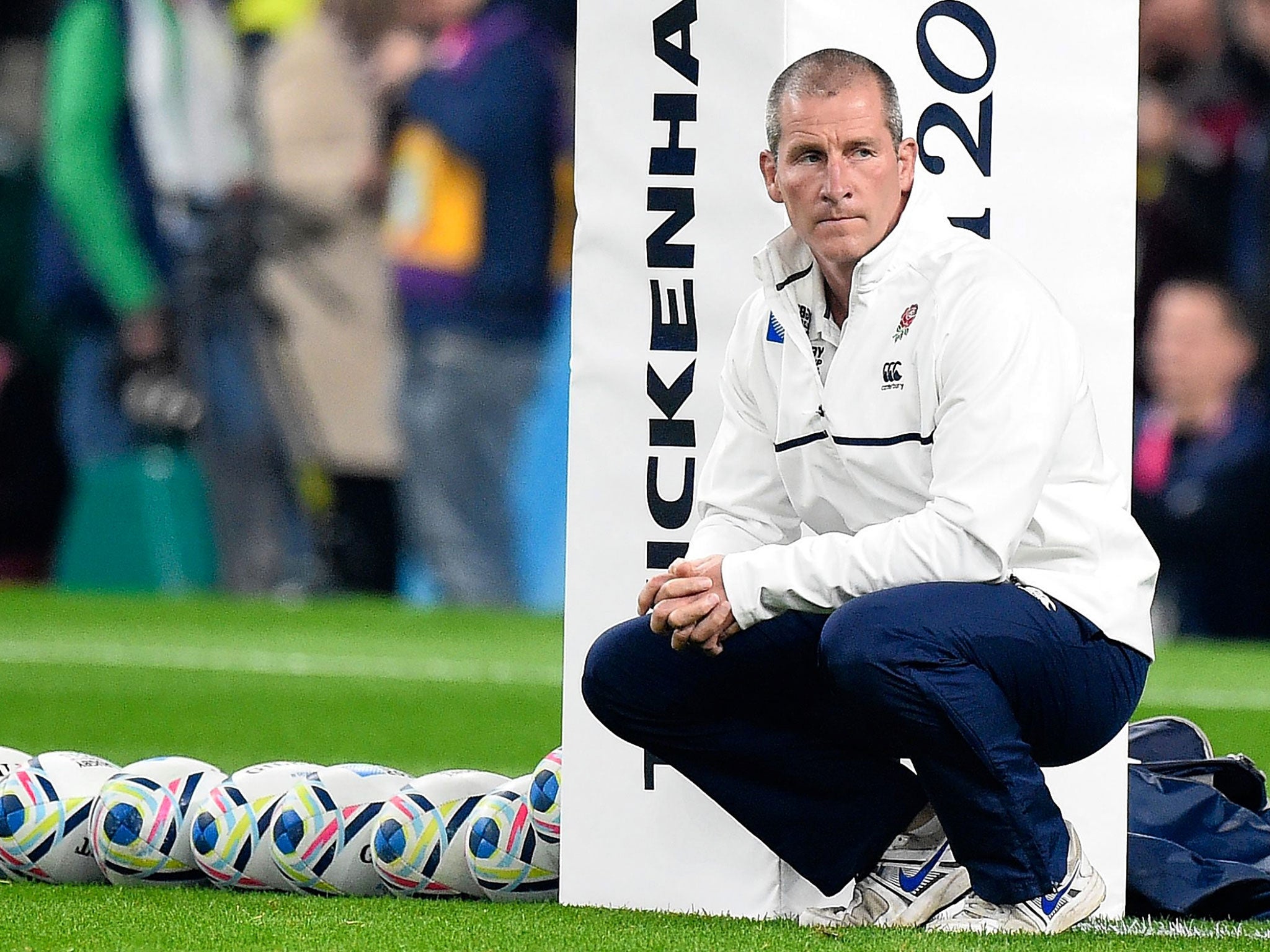Stuart Lancaster couldn’t cope when the pressure gauge was in the red
COMMENT: In the end, it was poor selection that did for sincere, honourable Lancaster

For sale: one tin hat, heavily dented; one flak jacket, riddled with bullet holes. It is barely a month since Stuart Lancaster jokingly included these items in a list of must-have fashion accessories for the modern-day England coach – an outpouring of gallows humour from a man with very little to laugh about – and now that his four-year spell as red-rose boss is officially over, he can place them on the open market. Who knows? There may be some mug out there who fancies his chances of making the national team a success at global level.
As recently as eight months ago, Lancaster could legitimately have claimed to be a “careful owner”. Painfully for the Cumbrian and spirit-crushingly for those who genuinely wanted to see a sincere and honourable workaholic of a man make a success of what some of his coaching peers consider to be an impossible job, he was rather less careful in the 32 weeks between the end of the Six Nations, where England finished runners-up for the fourth consecutive season, and the end of a World Cup campaign that left them stranded in the darkest corner of Nowheresville.
Not to put too fine a point on it, he lost the best of himself in a fog of confusion and misjudgement at the very moment he needed to be at his most decisive and clear-minded.
He might, with a little TLC from his employers at the Rugby Football Union, have found a way of ensuring that Dylan Hartley, his errant but indispensable first-choice hooker, would be available for the first game against Fiji. Instead, he sat back helplessly as the disciplinary class slapped a ban on the Northampton forward – a suspension that reduced the England scrum to a state of horizontal pacifism, complicated life at the line-out and left the entire team grappling with an aggression deficit. Would Clive Woodward or Martin Johnson have worn it? Fat chance.
Lancaster might, had he been a really ruthless sort, have swallowed hard and summoned the exiled open-side flanker Steffon Armitage home to gloomy old Blighty from the sun-kissed shores of the Mediterranean.
There were sound enough reasons for deciding otherwise. Armitage had spent much of his career as a fully paid-up member of the Awkward Squad; he had extended his contract in France in the knowledge that he was compromising his prospects of World Cup rugby; and there were plenty of players in the existing red-rose party who were against a shifting of the goalposts.
As there may never have been an international coach so sensitive to potential disharmony among his charges, Lancaster’s move to stick rather than twist came as no surprise. But as the tournament wore on and the likes of Sam Warburton, Sean O’Brien, Francois Louw, Michael Hooper, David Pocock and the great Richie McCaw turned over opposition ball for fun, the questioning grew ever louder.

And then there was dear old Slammin’ Sam Burgess, who failed to live up to his nickname until he slammed the door on his union career and scuttled back to rugby league at a speed not witnessed at any point during his miserable flirtation with the 15-man code.
His fast-tracking into the England squad at the expense of at least three centres with an immeasurably greater right to be there was a nonsense, and Lancaster was at the heart of it. Out went the idea of players earning their places through weight of performance – of building up “credit in the bank”, to borrow one of the coach’s favourite phrases, and profiting from it. In came the idea of a ready-made world-beater who would subject the Welsh and Wallaby midfields to his “aura”. It was beyond risible and it cost Lancaster everything he had.
Eight days before he named his 31-man squad, Lancaster spoke with considerable clarity on one issue: the Northampton centre Luther Burrell, who had worked closely with the coach during their shared time at Leeds and become something of a protégé, would be included. Indeed, he had been pencilled in to start against Fiji on opening night.
When the final cut was made, Burrell found himself on the slag heap, alongside the likes of Billy Twelvetrees and Kyle Eastmond, both of whom had shouldered the midfield responsibilities over the previous 12 months. Burgess? A man who had done precisely nothing to justify selection for his club, let alone his country, was there, safe and sound.
Lancaster had been particularly concerned at the conspiracy theories flying around as a result of the privileged access handed to the newcomer: that Burgess had been virtually guaranteed a Test place as a sweetener; that the RFU had a financial interest in the player; that there were commercial imperatives at work. Both the coach and the governing body rejected these rumours out of hand, but the fact that they gained such momentum spoke to the scale of the miscalculation.
In the end, it was poor selection that did for Lancaster. He was sure-footed in many respects: in restoring a sense of pride and common purpose to the national squad after the miseries and calamities of Martin Johnson’s stewardship; in his grasp of fine detail; in his understanding of, and connection with, the England age-group teams and the outstanding talent therein. But in that one area, the most crucial of all, he was found wanting when the dial on the pressure gauge hit red.
Was he, in the end, a good enough coach? He felt he was in the sense that he trusted his values, but in international terms he was an innocent at large. In an interview with this newspaper some 18 months ago, he was asked whether there might be something of the “imposter syndrome” lurking in the back of his mind. “When you don’t have credibility... you have to earn it,” he replied, carefully. “A coach who doesn’t start with a high rating but deals well with people, shows good management skills and is honest, forward-thinking and technically adept... he’ll rise towards the top of the graph.”
Lancaster was most of those things, if not all, and his stock rose. Sadly for him, share prices go down as well as up.
--
Potential replacements
Michael Cheika
Rumours of an initial English approach to the abrasive Wallaby coach have been circulating all week. Young, intelligent, successful, super confident...what’s not to like, apart from his contract in Sydney?
Eddie Jones
Intelligent, successful, super confident...and quite a bit older. Blessed with a razor-sharp mind and a personality to match, but does he really need the hassle after recent health problems?
Warren Gatland
Under lock and key in Wales, he would be an obvious contender for England if he showed the slightest interest in crossing the River Severn. A tough-minded winner.
Wayne Smith
A target for Stuart Lancaster in 2012, the revered New Zealander remains one of the game’s foremost thinkers. Unfortunately for the RFU, the All Blacks regard him as precious intellectual property.
Jake White
Unlike some, the South African World Cup winner would be readily available, despite his current club deal in France. Always mentioned at these moments, largely because he has the requisite experience.
Mike Ford
The only English-born Premiership boss with international know-how, albeit as a defence specialist, the Bath coach would be handily placed in the event of the RFU drawing a blank elsewhere.
Join our commenting forum
Join thought-provoking conversations, follow other Independent readers and see their replies
Comments
Bookmark popover
Removed from bookmarks